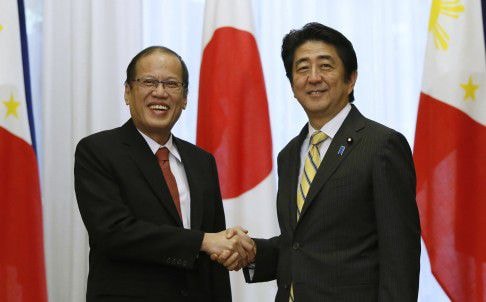China makes Philippines - Japan closer and closer
(Baonghean) - Philippine President Benigno Aquino is on a four-day state visit to Japan - his sixth trip since taking office in 2010. In the context of increasingly heated territorial disputes due to China's unilateral actions causing tension in the East China Sea, especially the South China Sea, a closer handshake between the Philippines and Japan seems to be "inevitable".
This visit of the Philippine President to Japan is considered a very good opportunity for both countries to strengthen and tighten their defense and security relationship. Of course, the main reason is to cope with current common challenges, especially related to tensions in the East Sea. Currently, China still unilaterally claims sovereignty over most of the East Sea, covering the waters of neighboring countries such as the Philippines, Malaysia, Brunei and Vietnam. Specifically with the Philippines, China is challenging Manila when it controls the Scarborough Shoal, which the Philippines claims sovereignty over. More dangerously, at this time, China is urgently carrying out activities to renovate reefs, build large-scale reclamation, and illegally build outposts... Not only the Philippines, Japan is also entangled in disputes with China over the Senkaku/Diaoyu Islands in the East China Sea, which both sides claim sovereignty over.
 |
| Philippine President Benigno Aquino (left) and Japanese Prime Minister Shinzo Abe. Source: Reuters |
From being two enemies during World War II, the new common "enemy" named China has made Japan and the Philippines accelerate closer together. On that path, this visit of the Philippine President is a very important step. Specifically, the highlight of the visit is expected to be the two sides starting the transfer of defense equipment from Japan to the Philippines. According to analysts, Japan's provision of 10 new patrol boats to the Philippine Coast Guard is an unprecedented move, showing that the closeness in Japan-Philippines relations has progressed to a significant level of attachment. This event is to fulfill the commitment that Japanese Prime Minister Abe made during the meeting in July 2013, that he would deploy forms of support, including improving the capabilities of the Philippine Coast Guard. Accordingly, these 10 patrol boats will carry out the task of monitoring disputed territorial waters.
The move shows that Japan’s partnership with the Philippines is growing beyond just joint naval exercises. The most recent was the historic naval exercise in the South China Sea in mid-May and before that, the first anti-piracy exercise between the two countries’ coast guards.
Observers say that although it does not change much the balance of naval forces in the East Sea, specifically between the Philippines and China, for the Philippines, this transfer can be said to be an important step in strengthening forces in terms of both physical facilities and awareness of maritime issues. Not only that, it is expected that during this visit, President Aquino and Japanese Prime Minister Abe will discuss maritime disputes in the region in general and between the two countries and China in particular. Thereby, the Philippines will provide information about the lawsuit against China to Japan. Obviously, increasing awareness and understanding of a common concern is extremely necessary at this time.
In terms of the goal of strengthening cooperation, in addition to dealing with the threat of China, both the Philippines and Japan have other reasons. For Japan, Prime Minister Shinzo Abe is implementing a "pivot" strategy to Southeast Asia and the Philippines is being chosen to take on an important role in this strategy. One of the evidences of the interest in this Southeast Asian country is that Japan plays an important role as a mediator in the peace negotiations between the Philippine Government and the Moro Islamic Liberation Front (MILF), ending 40 years of conflict in the southern Philippines.
On the contrary, joining hands with Japan is a step forward in the roadmap to strengthen partnerships with allies in the region, aiming to strengthen the defense potential of the Philippines. On the other hand, with the strategy of using soft power to enhance its image in the Asia-Pacific region that the Japanese Prime Minister is implementing, the Philippines will inevitably be one of the countries that benefit. Therefore, according to analysts, Japan - the world's third largest economy is being evaluated by Philippine President Aquino as one of the main factors promoting the economic growth of the Philippines.
Thus, “heavenly time - favorable location - harmony of people” is making the diplomatic relationship between the Philippines and Japan closer and more intimate than ever, stemming from reasons related to China to the image enhancement policy and economic development goals of both sides. It can be said that this is beneficial for the Philippines, Japan and for peace, security and stability in the region.
Phuong Hoa






